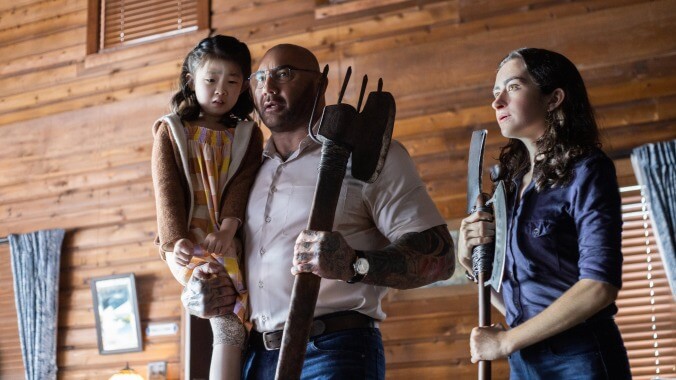Kristen Cui, Dave Bautista, and Abby Quinn in Knock At The Cabin Photo: Universal Pictures
[Note: This article contains major spoilers for both Knock At The Cabin and its source novel, The Cabin At The End Of The World.]
The cultural conversation around M. Night Shyamalan’s filmography tends to gravitate toward endings. From The Sixth Sense onward, Shyamalan has favored, for decades now, a storytelling style wherein the last few minutes of his movies serve as a key to unlocking a fuller understanding of all the ones that came before. And while the general merits of all that preceding filmmaking render accusations that he’s not much more than a glorified twist merchant unfair, it’s also been a persistent aspect of his style, one he’s steered into quite happily as the years have gone on.
Which makes it fascinating to hear (via an interview with Variety, conducted at the film’s premiere) Shyamalan and his writers talk about the director’s latest effort, Knock At The Cabin, in terms of its ending—especially since one of the first things the director and his cohorts did when adapting Paul Tremblay’s book The Cabin At The End Of The World (a rare instance of Shyamalan not working from an original story) was jettison Tremblay’s ending in favor of a new one.
Shyamalan’s co-writers, Steve Desmond and Michael Sherman, don’t mince words about why the ending had to go, either: It was just too damn dark. Both stories center on a family (with the fathers played by Jonathan Groff and Ben Aldridge in the film, with Kristen Cui as their young daughter, Wen) who are accosted by strangers who claim that, unless one member of the family willingly sacrifices themselves to die, the world will end. In the novel, the inevitable confrontations that follow have a horrifying outcome: Wen is accidentally shot and killed (failing to fulfil the “willing sacrifice” bit in the process), leaving all involved horrified with grief. Her two fathers kill or drive off the remaining attackers and refuse to sacrifice themselves; Tremblay leaves it unclear if the world will end.
Here’s Desmond and Sherman, talking about why they and Shyamalan ditched Tremblay’s ending in favor of one where Wen survives, with one of her fathers eventually giving his life to apparently save the world (and with the apocalypse itself much less ambiguously rendered):
[Shyamalan] had a whole new vision for what the ending could be. The book is the book, and the movie is the movie, and we think they both were exceptional mediums. This is a big, wide release movie that is meant for a very large audience. There are some decisions that the book made that were pretty dark and may have been a little too much for a broader audience. That was a decision that [Shyamalan] immediately recognized. It’s a great ending now.
(Interestingly, Tremblay suggests that his own ending is the less depressing one, since it leaves the situation ambiguous, rather than positing a universe where God or whoever absolutely pulls this kind of manipulative shit on his creations: “I find it horrific there’s this higher power that is just going to willy-nilly sacrifice humans for everybody else.”)
As for Shyamalan himself, he argues that his film walks the line between optimistic and nihilistic: “The most important thing at the end is that everybody puts themselves in the characters’ shoes. What would they have done? I feel that genre helps me tell emotional stories. I’m generally an optimistic guy, so I get to do really dark things, and the audience feels held by somebody that isn’t nihilistic. I can push pretty hard because you can feel the vocabulary is not from someone who’s trying to hurt you.”

